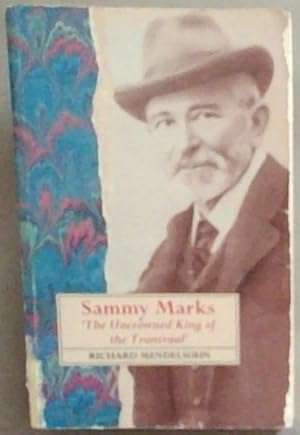
Sammy Marks: The uncrowned King of the Transvaal
Check my rate
| Main centres: | 1-3 business days |
| Regional areas: | 3-4 business days |
| Remote areas: | 3-5 business days |

| Main centres: | 1-3 business days |
| Regional areas: | 3-4 business days |
| Remote areas: | 3-5 business days |
Published by David Phillip Publishers (Pty) Ltd, 1991, softcover, illustrated, index, 304 pages, condition: as new.
Marks arrived at the Cape in 1869 and was shortly followed by his cousin Isaac Lewis, also from Neustadt-Sugind, with whom he forged the enduring partnership of Lewis & Marks. Marks started his career as a peddler in the rural districts of the Cape, but soon headed for Kimberley where his rise to prosperity began. They made a modest living supplying goods to mines and diggers, and later branched into diamond trading. Moving to Pretoria in 1881 he gained the confidence of President Kruger and the government of the Zuid-Afrikaansche Republiek (ZAR). His friendship with Kruger became close and enduring and they had in common humble origins and a ready wit. Marks advised that Kruger build a railway line from Pretoria to Lourenço Marques.
With the discovery of gold in the boomtown of Barberton and later on the Witwatersrand, Marks acquired business interests in both places, but found the coalfields of the southern Transvaal and northern Free State to be a more lucrative prospect. The Zuid-Afrikaansche en Oranje Vrijstaatsche Mineralen en Mijnbouwvereeniging was founded in 1892 to mine these coal deposits, and later gave the town of Vereeniging its name. Lewis & Marks business interests included a distillery, a canning factory and a glass factory. Their firm opened collieries at Viljoensdrif and elsewhere, and also started Vereeniging Estates Ltd., which was dedicated to developing agricultural land along the Vaal River. Marks pioneered the use of steam tractors and progressive farming implements. He also sponsored the establishing of flour-mills and brick and tile works at Vereeniging. In 1910 Marks was nominated as senator in the first Union Parliament, an office he held until his death. When A. H. Nellmapius was unable to execute a manufacturing contract he had concluded with the Government due to lack of funds, Lewis & Marks took over and constructed the Eerste Fabrieken near Pretoria.
In 1898 Marks was allowed the extraordinary privilege of using the state mint for a day. Marks used the opportunity to strike 215 gold tickeys three-penny pieces that were normally silver as mementos for his relatives and friends, including President Kruger himself and members of the Volksraad. The gold would certainly have come from the Sheba mine near Barberton, the only gold mine in which Marks had a substantial stake. This famous incident says much about the close relationship that these two men had. There was often a blurring of the boundary between personal and State property. Their relationship was almost feudal, as that of a king and highly regarded subject. Besides President Kruger, Marks enjoyed the trust of the Boer Generals Botha, De Wet, and de la Rey, and the respect of Earl Roberts, Lord Kitchener, and Lord Milner, and he played a not inconsiderable part in the negotiations for the cessation of Anglo-Boer hostilities at Vereeniging on 31 May 1902.